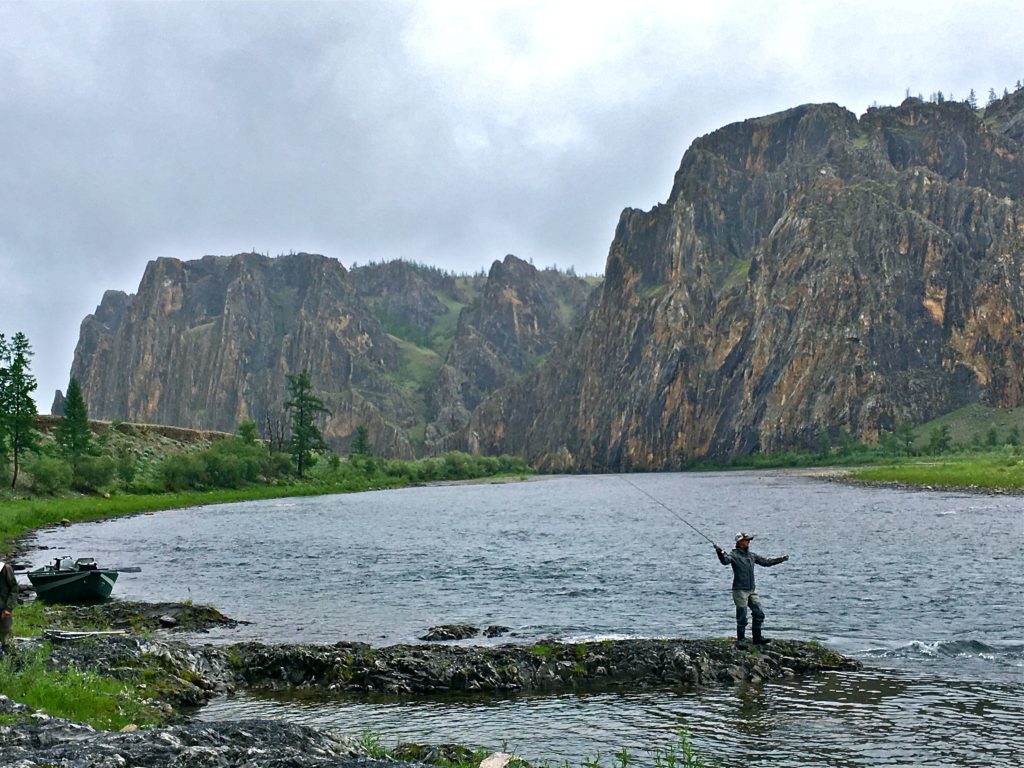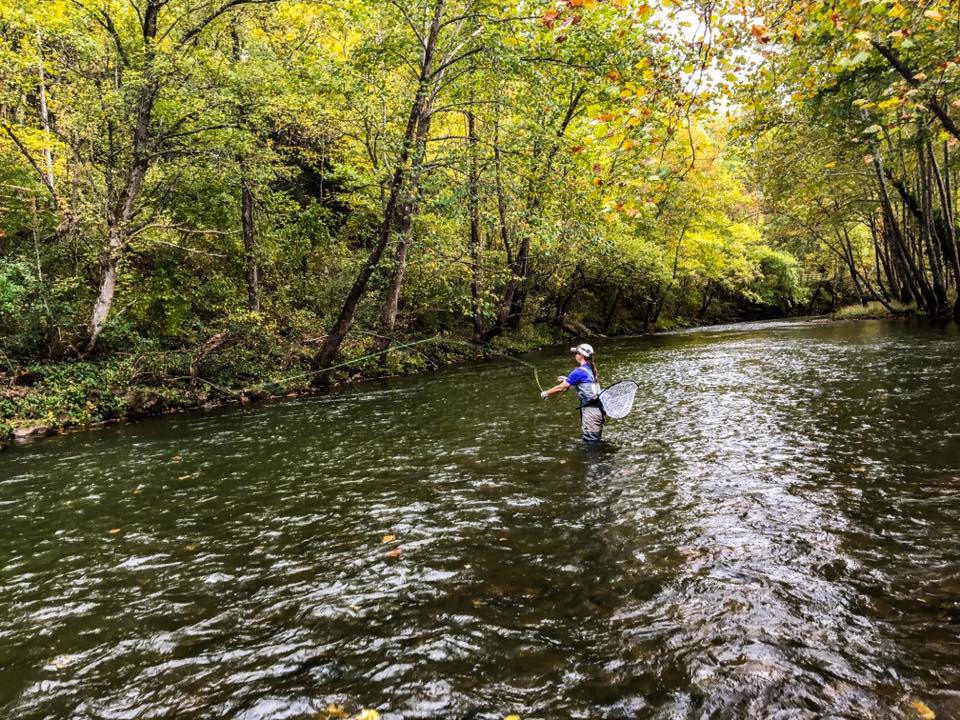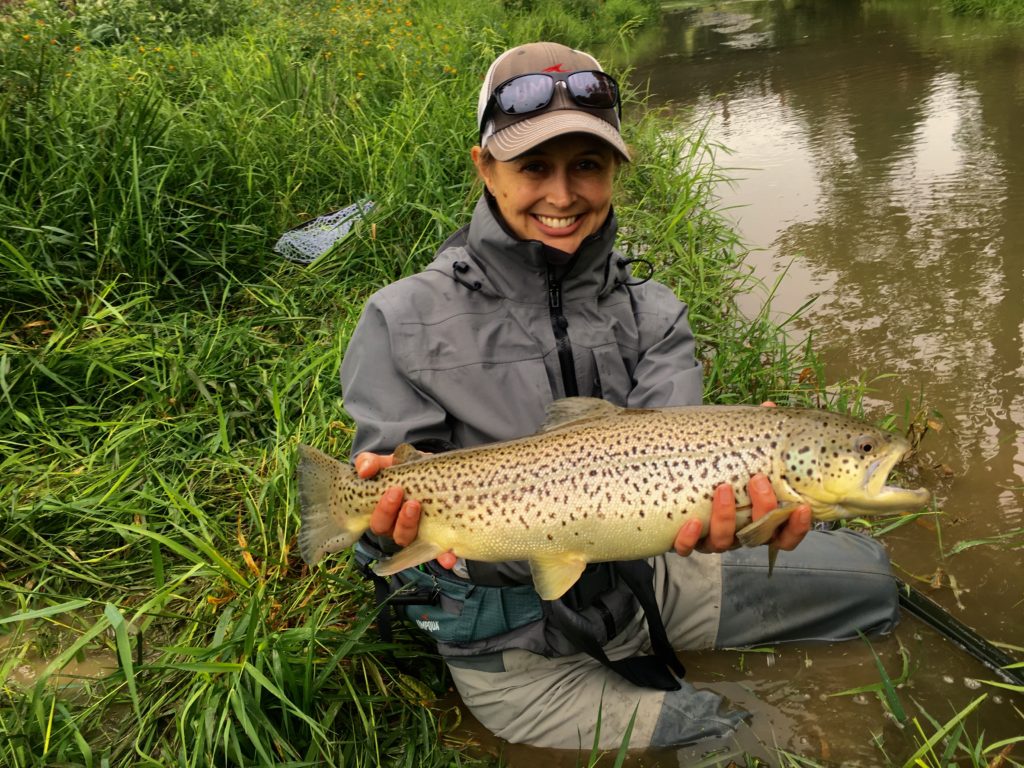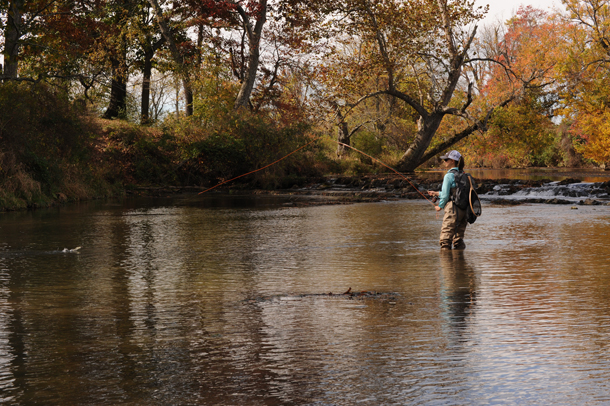By Emily George
Connecting with nature around the world through a fly line is a part of Karen Horodysky’s lifestyle.
“You get to go to beautiful places and connect with nature; your mind is focused but it’s peaceful, and you’re doing it in a beautiful environment,” says Karen Horodysky, an employee at Virginia Department of Game & Inland Fisheries (DGIF) who travels the world fly angling, but calls Virginia her favorite fly fishing destination. Horodysky was introduced to fly angling by her husband nearly five years ago, which has become a lifestyle they share together.
Even after hooking onto Atlantic salmon in Iceland, and Siberian taimen, lenok, and grayling in Mongolia, fishing trout in Virginia still stands at the top of Horodysky’s list. She considers the Jackson River special regulations area her favorite spot to catch trout.

Fly fishing in Mongolia.
Horodysky says Virginia offers a lot of diversity of opportunity for an angler. She says if an angler is deciding where to go, they should just ask themselves, “What experience do I want today?”
She takes action with a fly rod on her belief that fly fishing is an asset to conservation, and regards her work at DGIF.
“Fly fishing raises funds for conservation through license sales and fees,” she says. “In addition, many fly anglers are conservation-minded: catch and release is a common practice, and fly fishing organizations often partner with local agencies to restore and protect our natural resources.”

Karen fishing the Jackson River, one of her favorite destinations.
Her commitment to conservation combines with her work at DGIF – the leader in conservation of fish species across the state. Her zeal to cast a fly rod motivates her to ensure both anglers and fish species have equal opportunity in the future.
Horodysky is the Fish and Wildlife Information Services Aquatic Biologist at DGIF. She works to ensure that aquatic data that comes in to the agency, whether by DGIF biologists or external sources, are stored, managed, shared, and interpreted correctly.
These data are used to make decisions about conservation and management, and making sure that there is access to data that are accurate, is important for making good decisions. She has a background in fisheries, and previously served as a field fisheries biologist before becoming a liaison between aquatic biologists and information management.
“I believe in the work,” she says. “Our biologists spend a lot of time and energy collecting these data that are essential for managing our natural resources.” Having a substantial way to manage data enables biologists and managers to decide how to use and share data with other biologists internally or externally. The agency works together for a common goal, and Horodysky’s role is to help these two groups perform their jobs more effectively.
“I really believe in the people that work here at the agency,” says Horodysky. “We all went to school to learn different things but we are all here to conserve, connect and protect.”
 Horodysky will be a fly casting instructor at the Fly Casting at Fine Creek event this month. Her primary goal is to inspire others and give back by educating someone else of the sport just like she was introduced. She says that there is often a notion that fly fishing is difficult, but despite the challenges, it is not impossible to learn.
Horodysky will be a fly casting instructor at the Fly Casting at Fine Creek event this month. Her primary goal is to inspire others and give back by educating someone else of the sport just like she was introduced. She says that there is often a notion that fly fishing is difficult, but despite the challenges, it is not impossible to learn.
“I especially want to inspire kids to ensure the next generation appreciates our natural resources and will want to spend time outdoors,” says Horodysky. She also wants to inspire women.
“I believe there will be a day when we won’t say, ‘we need more women fishing,’” she says. “But for now, that statement is true. It doesn’t have to be a male-dominated sport – it should be something for everyone to enjoy doing.”
 A buoyant person that loves what she does in the office at DGIF and out in the field, Karen inspires conservationists everywhere. DGIF is fortunate to have such an inspiring person to fit this integral role, who shares her knowledge and passion beyond the boundaries of the agency. She doesn’t have her next trip planned, but she dreams of fishing for tiger fish in Tanzania, or arapaima in the Amazon. Locally, she plans to cast her first fly line for smallmouth bass this summer near the Harrisonburg area.
A buoyant person that loves what she does in the office at DGIF and out in the field, Karen inspires conservationists everywhere. DGIF is fortunate to have such an inspiring person to fit this integral role, who shares her knowledge and passion beyond the boundaries of the agency. She doesn’t have her next trip planned, but she dreams of fishing for tiger fish in Tanzania, or arapaima in the Amazon. Locally, she plans to cast her first fly line for smallmouth bass this summer near the Harrisonburg area.
“It’s the best of both worlds.”

